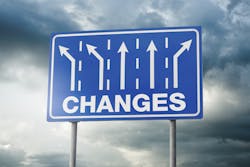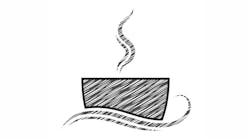Take a look at the future for our businesses and our industry. Everything is changing. We need more products – new and different products. Locations are telling us that we cannot even offer some of our best selling products. People don’t carry cash and want to pay with cards or smartphones. We will have to provide nutritional/allergen information to shoppers before they make a purchase. Micro markets are being added to RFPs from current and prospective clients. It’s all this and much, much more.
How are you doing with these big issues? Dealing with even one of these subjects requires strategic thinking, solid planning and thorough execution. Having to implement several (and maybe all) concurrently will be an intimidating and challenging problem for any business, large or small. That’s where we encounter the traditions in our business.
But we’ve always done it that way
Among the words related to traditions are: rituals; practices; habits; beliefs. This leads us to that dangerous sentence, “But we’ve always done it that way.”
We all have traditions in our everyday lives – in our companies, in our families and personally. Let’s stick with business here.
There are potential gains if we make changes in how we operate our businesses. But there are risks too. Making the wrong decision or failing to execute the change properly can disrupt daily operations.
Here are a few good questions to ask when dealing with (tradition versus) change:
- If we were starting our business today, would we do (this) or not do it? Why?
- If we do (this), what will the benefits be for our customers and our own people? Why?
- If we do (this), what can we stop, or at least reduce, doing?
- How long will it take and how much will it cost to do (this)? It will almost always take more time and cost than expected. Be extremely thorough when planning for the timeline and implementation costs.
- Will sales increase (or not)?
- Will operating and/or fixed costs decrease (or not)?
- If we do (this), will it help us add new accounts?
- If we do (this), do we risk our relationship with any of our existing accounts?
- If we do (this), what training will we need to do with our staff? Who will do that training? If we must do the training, who will train our trainer(s)?
- If we do (this), what if anything different will we have to communicate with the accounts we serve and the people who shop at our locations?
Bad decisions can affect your survival
In “big” companies, there are people available to attack the changes involved in new payment systems (or any of the other challenges noted in the first paragraph). In medium-sized or smaller companies, dealing with issues like these is potentially about survival.
When planning to make a change, be very deliberate in evaluating the company you will select. It’s more than the product, equipment, system, device or whatever else they are selling. Which one will do the best job of teaching you how to succeed? Can they really educate you and help you run your business more effectively and more efficiently? Be very specific in demanding a thorough schedule of the implementation and what the supplier will do after the implementation.
Let me share an example. A client, a small vending operation, offered an innovative concept and products not typically seen in our channel. She had engaged a vending management system to monitor her machines, placed at 20 different locations. The provider did not demonstrate leadership in showing her how to use the data to run the business. To be able to track and evaluate the diverse product categories being sold, we downloaded the data. Then we created our own analytical formats and tools using Excel worksheets. Lesson learned. Be sure that the suppliers you select are committed and actively involved in your success.
Don’t be afraid of change. Don’t be stuck with “But we’ve always done it that way.”
If you want your business to survive and prosper, you’ll have to make lots of changes. Otherwise you’ll be stuck in the past.
It all comes down to selling more stuff.
When Breaking Tradition Delivers – A Personal TalePerhaps there is another way to view tradition versus change. Think about our Thanksgiving. Not the holiday itself. Just consider the meal. Lots of traditions are involved. There are long-time family-favorite recipes – the turkey, the stuffing and so many wonderful desserts. This is tradition at its best. Just as our family was planning for the 2015 holiday event (which was to be in Austin, Texas), two interesting things happened, essentially concurrently. First, our son and daughter-in-law called us to suggest that we have BBQ brisket for our Thanksgiving dinner. But it was not just any BBQ brisket. They proposed that we get it from Franklin Barbecue. You’ll see long lines there every day. Famous chefs rave about it. Visiting dignitaries and politicians make it part of their Austin itinerary. Second, we read several articles suggesting that it was time to change some of those Thanksgiving traditions. One, A Plan to Fix Thanksgiving, got our attention, especially the point about serving something other than turkey. We decided to do it. To get to the point, we had a great dinner, probably one of our best ever Thanksgiving meals. We served a few of our traditional recipes and a turkey breast as well. The Franklin Barbecue brisket was beyond description. Moist and tender beef with a beautiful smoke ring. The bark (that’s the outer “crust”) was perfect. Their barbecue sauce was the ideal complement to the brisket. It was one of the very best things we ever ate, probably in my top five. What’s the point? There are times to change, to challenge tradition, even those things and practices traditions we love and have enjoyed for many years. It was fun and a real taste treat for our family. In business, there are also times to abandon traditional practices. The results just might prove to be positive and profitable too. |

Paul Schlossberg | Contributing Editor
Paul Schlossberg is the president of D/FW Consulting, which helps clients merchandise and market products in impulse intense selling environments, such as vending, foodservice and convenience stores. He can be reached at [email protected] or 972-877-2972; www.DFWConsulting.net.
Most recently he has begun writing a bimonthly online column titled "Sell More Stuff" featured on VendingMarketWatch.com.







